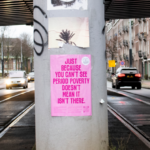Period poverty can sound like an abstract term, something that does not happen to people you know, to students in supposedly wealthy and progressive cities, like Amsterdam. Unfortunately, it is a fact that almost a third of people who menstruate experienced period poverty in Amsterdam over the past year. But what does period poverty even mean? And how can we improve the situation? E&M-Author Antonia Frank talked to Tammy Sheldon from the Neighborhood Feminists, an Amsterdam-based foundation fighting period poverty.
The Neighborhood Feminists are very intentional in their actions. When they started their journey, they wrote up some principles to guide them along the way, help them set priorities, and make sure their projects are in line with their philosophy.
The Importance of Flexibility
‘The first of our principles is to be flexible and context specific. And that means to not make assumptions about what other people’s needs are.
The reality is that I may have a certain perspective and a certain view about how things should be. But the person opposite me that may need some support has a whole different background and a whole different lived experience, and may not buy into all the things that in my privilege I can already state clearly for myself.
So that kind of flexibility, saying this is their reality and that’s legitimate, and finding ways to work together, that’s [for us] a structural part of effective community work.
The second principle is to be intersectional feminist. and actively anti-racist. We develop them this way not because we think this is the perfect way to be, but because it fits, these ideas drilled down to what makes most sense for us.
Lived Solidarity
And another one of our fundamental ideas in this, and I don’t know if it’s written in the guiding principles per se, but it is something that we very strongly believe:
Everything that we do is not charity. It may cost money, it may take time and energy, but it is not charity. It is solidarity.
Because it comes down to this idea of basic human rights. And our idea is that we [all of us] need, we can find ways to work with others and work toward increasing human dignity and connection in the spaces in which we move, to the best of our abilities. And so those guiding principles serve as a kind of operating system that we try to be intentional about, while we’re actually taking on the work that we can and can’t do.’
Planned Obsolescence
‘We have a lot of interests! So we have sometimes made tough choices, in order to ensure that we can definitely reach this goal of ending period poverty.
Our idea is not to make people dependent on us. Our idea is to help people now, and then work toward longer term solutions, so that those people don’t need to constantly be depending or worried and on the good graces or some sort of idea of charity of others.
And that’s where the idea of planned obsolescence comes in. We don’t want to be doing this project forever. And I think honestly, while many neoliberal governments would be perfectly happy if all these little individual organizations [like ours] got busy and did all this work, it’s work that really should be handled by the city. And so that’s where this logic comes in. We don’t lose sight of people, when we start doing advocacy, it is still about people, but we’re finding ways to help them that are structural. To make sure that there’s not just one location in the city where you can get the period products you need, but any number of them while you don’t have to travel hugely out of your way, for example. And that it becomes normalized to talk about periods and period poverty and all the things that develop along with that, that improve us as a community, but also as a city.’
‘Having said all that, it’s super important to keep perspective. Also because you are your own best tool for change. And if you aren’t recognizing your own needs and your own well-being while you’re going after all the things, you can get a little bit lost in how much there is to do. You can do a lot, but you can also get a little bit lost. And that is something that is part of the flexibility that I think we have to keep in mind when we have our principles, and we try to actively live them in a deep way in our lives.’
Poverty in Amsterdam
The Neighborhood Feminists founders, staff and volunteers all have very different backgrounds but came together in Amsterdam because they saw a clear need, right in the city where they live. ‘You don’t have to go help poor people way off in some other faraway place.
When people start finding out stuff about the community in which they live, they start realizing how little they know about each other. And it starts to become an opportunity to actually improve things. ‘
1 in 5 people live below the poverty line in Amsterdam according to city statistics. These numbers include neither homeless nor undocumented people, who are often severely affected by poverty.
‘So we know that a city that is outwardly wealthy, like Amsterdam, like all the other wealthy cities in the world, has serious issues with period poverty. The city establishes the poverty line at 120% of minimum wage, that translates to one person surviving on 1019 euros per month. They’re supposed to pay for everything on that. So when you have that statistic in your head, and then you have the additional statistic from our research, which is that 27% of people who menstruate experience period poverty at some point, you see that [this issue] is hiding in plain sight. One that people are quietly struggling with, because there’s this double taboo because we don’t talk about these things.
And so that’s one part for me that completely infuriates me. But the reactions that people have to this information also give me hope, because people genuinely don’t understand what it concretely means to live at or below the poverty line. Another striking example is that 77% of the single-parent homes here are living under the poverty line, and of those 87% are led by the mothers. So if you have a mother with a teenage kid who’s menstruating, you are seeing intergenerational poverty, you have a teenager who is just not willing to ask her stressed-out mother for period products yet again, left struggling because the flow that she cannot help means that she’s already gone through her supplies for the month. That’s what this starts to look like.
And so, an important part for me is to build public awareness and help people understand what that means, that one in five people walking past you on the street is experiencing things that you and I just don’t have to experience.’
Read Part 1 here to learn more about the projects the Neighborhood Feminists have done so far!
Cover Image by Neighborhood Feminists











Show Comments
RPLA
How does Neighborhood Feminists prioritize solidarity over charity in their work, and what strategies do they employ to foster a sense of collective empowerment among the communities they engage with?
Comments are closed.